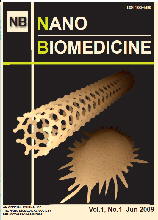
Nano Biomedicine
ORIGINAL ARTICLE
Effects of C60 Fullerene on Cell Differentiation with EL-M3 and ES-R1-EGFP B2/EGFP Cell Lines
Koichi IMAI1, Tetsunari NISHIKAWA2, Tomoharu OKAMURA2, Akio TANAKA2, Kazuhiko SUESE3,4, Yoshitomo HONDA5, Tsubasa SHIRAI6, Fumiya OGAWA7, Hirofumi SAWAI8 and Fumio WATARI9
1Department of Biomaterials, Osaka Dental University, Osaka, Japan
2Department of Oral Pathology, Osaka Dental University, Osaka, Japan
3Department of Esthetic Dentistry, Osaka Dental University, Osaka, Japan
4Department of Postgraduate Clinical Training, Osaka Dental University, Osaka, Japan
5Institute of Dental Research, Osaka Dental University, Osaka, Japan
6Graduate School of Dental Medicine (Biomaterials), Osaka Dental University, Osaka, Japan
7Department of Postgraduate Clinical Training, Osaka Dental University, Osaka, Japan
8Department of Internal Medicine, Osaka Dental University, Osaka, Japan
9Graduate School of Dental Medicine, Hokkaido University, Sapporo, Japan